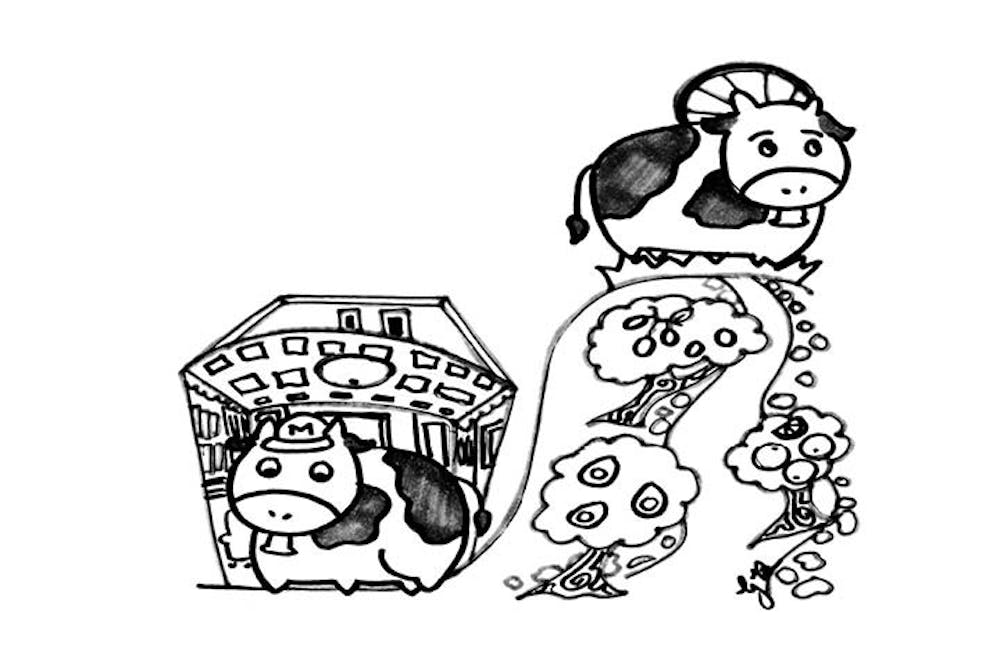Terracotta hexagons tessellate the floors at the U.S. Environmental Protection Agency in Washington D.C., where I intern. Soles pat, dignified, across them as agents flood in and out of the aisles office to office, a loose collared dance. My desk, flush with the copier, features an Escher print, a portrait of my parents and soft stones I collected on California’s coast. I doze watching swarms of foot traffic in the corridor, which evokes a Southwest terminal moments after deplaning. One of the pebbles warms in my fist.
The internship started Monday, but my mentor is out West for the next two weeks. I do not have a badge for building clearance yet – they say two weeks, though the office veterans add six – and my computer setup has been tortoise-pace. I am the youngest in the building, probably on the whole block.
I am here in search of meaningful work. Two years into college and back from the honeymoon, disenchantment set in. The outcomes for my Middlebury 60-hour work week were letters and numbers, not social reform or justice. In the age of the climate refugee and Black Lives Matter, thousands were sounding the alarm, and meanwhile, I was unresponsive, a bovine bumming around greens under snow, spouting facts like broadsheet and nightly holed up in a dusty inglenook of Axinn.
Last fall, I met with Dean Hanson, asked for temporary leave and so started my gap semester, a season released from routine, hypothetical coursework and doused in rough-and-tumble “real” life. I was interested in enhancing lives, not proceeding with mine.
My time away did, however, start inward at a Buddhist monastery in the orchards north of Escondido, California. I lived under the rules and regimes of practicing monks of the olden Thai forest tradition. As a layman for one month, I attended morning and evening chants, prepared meals, swept paths and hiked to the groves down in the foothills to collect fruits – avocadoes, oranges, kumquats – to trade in town. The experience nursed my inner self. I read, wrote and meditated insatiably. I found sustentative calm, millennia-old wellsprings of wisdom, and more distilled notions of what I hope to accomplish this year, decade and century.
Days after leaving Metta Forest, I was back East, attending the weekly roundtable brief for EPA’s Climate-Ready Water Utilities (CRWU) Initiative, the office in which I now sit. CRWU is a program within the Water Securities Division that develops climate change risk assessment tools and strategies for water utility infrastructure operators. Picture an extreme weather remediation panel, though specific to the water sector, scaled nationwide and tailored by U.S. region. So far as glimpsed by the intern, there seems to be an overwhelming amount of impactful work conducted here. The CRWU Initiative’s efforts directly protect water treatment and transport infrastructure around the country, for decades and for millions.
In the thick of my semester away from Middlebury, I see clearer. Not in the sense of waning astigmatism or wearing prescription lenses, but in the sense of understanding. I can hear a procession of gridiron coming-together: intelligibility. So inexorable are our bounds today from college to employment that my generation’s youths – particularly, those of the nation’s college elite – are losing sight of themselves. College-age millennials are wearing blinders, and as I have come to discover, it has meant stepping away from schoolwork to lower them, take another look and gain finer resolution. That mental image we sustain of how we are supposed to go through our education should not, and cannot, blind us. College “conditioning” can wait. It is time to know – precisely and concisely – what we are doing in college in the first place. As the globe gains weight, its temperature rises slowly and sprawl persists on the scale of continents, I cannot proceed listlessly, without genuine purpose or anchorage. In the light of the heat, this is my time to reassess. I welcome you to join me.
What our Connected Generation understands and a warmed world portends do not agree. There is a mountain range of evidence without manifesto and we are complacent, afraid to ask fresh or difficult questions – to look diagnostically at the old – because we do not want to see what we will find. Do not trivialize the importance of introspection. Evaluate and reevaluate. Critically review the armature of your plan. Consider time away, and take a closer look: it is the only way to create a climate tolerant of and furnished for reform. The view is not all bad.


![Copy of Editorial [Susanna] (3) (1) (2) (1).JPG](https://snworksceo.imgix.net/mbc/11c1e285-1b2c-4ee9-9d20-4a2f24335290.sized-1000x1000.JPG?w=1500&ar=16%3A9&fit=crop&crop=faces&facepad=3&auto=format)

